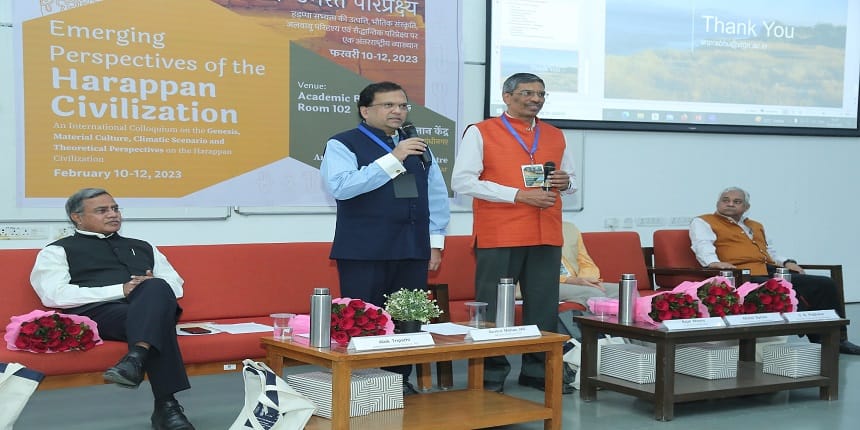IIT Gandhinagar inaugurates 'ASI Archaeology Chair’ to promote research in archaeological sciences
Arpita Das | February 11, 2023 | 04:45 PM IST | 2 mins read
The chair will explore some significant but unexplored aspects of the Harappan or Indus or Sindhu-Saraswati Civilisation and its legacy

NEW DELHI: IIT Gandhinagar's Archaeological Sciences Centre inaugurated the ‘ASI Archaeology Chair’ to boost scientific, multidisciplinary, fact-based approach to advance research in archaeological sciences. The chair is established by the Ministry of Culture, Government of India and Archaeological Survey of India (ASI).
A three-day international colloquium on “Emerging Perspectives of Harappan Civilisation” by Govind Mohan, Secretary, Ministry of Culture; Dr Alok Tripathi, Additional Director General, ASI and Prof Rajat Moona, Director, IITGN was also inaugurated.
The resources under this Chair will also be used to deepen research in multiple facets of the ancient Harappan, Indus, Sindhu-Saraswati civilisation.
Speaking on the occasion, Govind Mohan, Secretary, Ministry of Culture, GoI said, “The work that we are starting today is of great significance for the country from a cultural perspective. Vedas are the oldest known works of human expression, and they also speak of a civilisation which was hugely advanced and evolved in various aspects, including women empowerment, respect for environment, human ethos. On the other hand, we have remnants of the Sindhu-Saraswati civilisation, whose urban planning and architecture, drainage system, trade routes etc were so marvellous that many advanced civilisations of today would be envious of them. So we need to delve deeper to find if there is any commonality or connection between these two spaces. And I am sure that this colloquium and the Chair will help find answers to these questions in a scientific way by using state-of-the-art archaeological techniques. We will continue to work deeply with IITGN in order to uncover a lot of new paradigms and facts to help us understand fundamental questions for ourselves like who we are, where have we come from, and how have we evolved.”
Dr Alok Tripathi, Additional Director General, ASI, recalled the groundbreaking work by the late Daya Ram Sahni, a veteran Indian archaeologist who led the discovery of the Harappan Civilisation in the 1920s and termed this conference and Chair at IITGN as a new chapter to find out more about Indian culture, history, civilisation and its relation with the Vedic culture.
During the course of the next two days, more than 50 archaeologists, scientists, and research scholars from India and abroad are going to speak and present their research on the Harappan civilisation during different thematic sessions.
It will also include the genesis of the Harappan, Indus and Indus-Saraswati civilisation, terminologies; state and polity during the Harappan civilisation; trade contacts with other regions; technology during the Harappan civilisation; climate and environmental studies; bio-archaeological perspectives (floral, faunal, and other related studies); bio-anthropological or DNA studies and the composition of the Harappan population; The Indus script: inputs from archaeology and statistical studies; de-urbanisation processes of the Harappan civilisation; Harappan civilisation vs Vedic culture: possible points of contact or transmission; among others.
Another 15 research scholars will be presenting their work in posters. The colloquium will keep ample time for discussions on the way forward for future research.
Follow us for the latest education news on colleges and universities, admission, courses, exams, research, education policies, study abroad and more..
To get in touch, write to us at news@careers360.com.